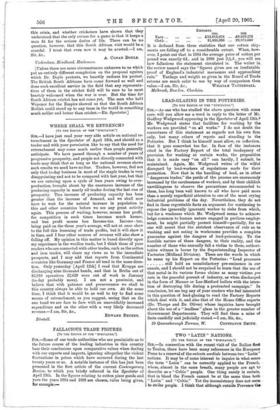WHERE SHALL WE RETRENCH? go TEE EDITOR OF THE "SPECTATOR. "]
SIR, I have just read your very able article on national re- trenchment in the Spectator of April 13th, and should as a trader and with your permission like to say that the need for retrenchment may come much earlier than people generally anticipate. We have passed through a number of years of progressive prosperity, and people not directly connected with trade may think that so long as the national revenue shows such results we need have no fear. Traders, however, feel not only that to-day business in most of the staple trades is very disappointing and not to be compared with last year, but that we are entering upon a cycle of lean years owing to over- production, brought about by the enormous increase of the producing capacity in nearly all trades during the last run of prosperity. This increase of producing capacity has been greater than the increase of demand, and we shall now have to wait for the natural increase in population in this and other countries before we see any great activity again. This process of waiting, however, means less profit, for competition in such times becomes much keener, and less profit means less Income-tax. Income - tax, being paid on the three year's average, will not at once show to the full this lessening of trade profits, but it will show it in time, and I fear other sources of revenue will also show a falling off. My opinion in this matter is based directly upon my experience in the woollen trade, but I think those of your readers who are connected with other trades, such as the cotton and iron trades, will share my views as to the immediate prospects, and I may add that reports from Continental countries like Germany and France all tend in the same direc- tion. Only yesterday [April 12th] I read that Krupps are discharging nine thousand hands, and that in Berlin out of 83,910 operatives 22,629 were out of work in January (to-day probably more). I am not a pessimist, and believe that with patience and perseverance we shall in this country always be able to hold our own. At the same time, I think that it would be as well to try to find some means of retrenchment, as you suggest, seeing that on the one hand we are face to face with an unavoidably increased expenditure and on the other with a very likely decreased revenue.—I am, Sir, &c.,
EDWARD BECKER.






































 Previous page
Previous page